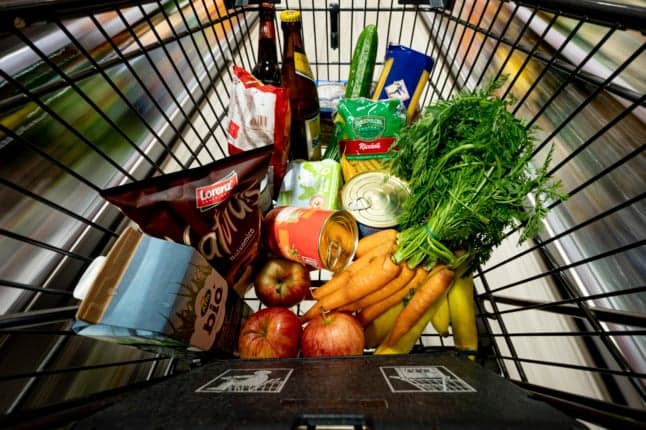March sees sharpest drop in food sales in Germany in nearly 30 years

Continuing high food prices in March saw Germans spending much less on groceries than a year ago, with poorer families cutting back more than most.
Faced with sharply rising prices, German consumers are cutting back on food purchases more than at any time in at least 29 years.
On Tuesday, the Federal Statistical Office reported that retail food sales in March were 10.3 per cent lower than a year earlier, marking the sharpest year-on-year decline in food sales since 1994.
The most likely reason for this is the high cost of food, which cost 22.3 per cent more in March than it did a year earlier. The price increase was three times higher than the overall inflation rate of 7.4 per cent.
The trade union-affiliated Macroeconomic Policy Institute (IMK) has said that it sees this development as "alarming" and expects poorer families to spend even less on groceries.
READ ALSO: Which products are driving up inflation in Germany?
According to calculations by the IMK, families with low incomes have regularly been hit harder by inflation than higher earners since inflation started to increase at the beginning of 2022.
"It can be assumed here that especially poorer families, who often buy poorer quality food anyway, will now save even more," said the scientific IMK director, Sebastian Dullien.
Concern for retailers
German retailers are increasingly feeling the strain as consumers cut back on spending at the supermarket. According to the Federal Statistical Office, their total turnover in March was 1.3 per cent lower than in the previous month, the strongest decline in five months.
"Sales are clearly in a downward trend," Alexander Krüger, chief economist at Hauck Aufhäuser Lampe Privatbank, commented. "Because of high inflation, retail will continue to have a hard time," he added. Compared to the same month last year, the retail sector recorded a real decline in sales of 8.6 per cent.
However, the IMK expects consumer purchasing power to increase in the coming months thanks to wage increases and tax-free inflation compensation premiums such as those negotiated for public sector workers.
However, the consumption level of the pre-Corona year 2019 is not likely to be reached again until at least 2025.
Comments
See Also
Faced with sharply rising prices, German consumers are cutting back on food purchases more than at any time in at least 29 years.
On Tuesday, the Federal Statistical Office reported that retail food sales in March were 10.3 per cent lower than a year earlier, marking the sharpest year-on-year decline in food sales since 1994.
The most likely reason for this is the high cost of food, which cost 22.3 per cent more in March than it did a year earlier. The price increase was three times higher than the overall inflation rate of 7.4 per cent.
The trade union-affiliated Macroeconomic Policy Institute (IMK) has said that it sees this development as "alarming" and expects poorer families to spend even less on groceries.
READ ALSO: Which products are driving up inflation in Germany?
According to calculations by the IMK, families with low incomes have regularly been hit harder by inflation than higher earners since inflation started to increase at the beginning of 2022.
"It can be assumed here that especially poorer families, who often buy poorer quality food anyway, will now save even more," said the scientific IMK director, Sebastian Dullien.
Concern for retailers
German retailers are increasingly feeling the strain as consumers cut back on spending at the supermarket. According to the Federal Statistical Office, their total turnover in March was 1.3 per cent lower than in the previous month, the strongest decline in five months.
"Sales are clearly in a downward trend," Alexander Krüger, chief economist at Hauck Aufhäuser Lampe Privatbank, commented. "Because of high inflation, retail will continue to have a hard time," he added. Compared to the same month last year, the retail sector recorded a real decline in sales of 8.6 per cent.
However, the IMK expects consumer purchasing power to increase in the coming months thanks to wage increases and tax-free inflation compensation premiums such as those negotiated for public sector workers.
However, the consumption level of the pre-Corona year 2019 is not likely to be reached again until at least 2025.
Join the conversation in our comments section below. Share your own views and experience and if you have a question or suggestion for our journalists then email us at [email protected].
Please keep comments civil, constructive and on topic – and make sure to read our terms of use before getting involved.
Please log in here to leave a comment.